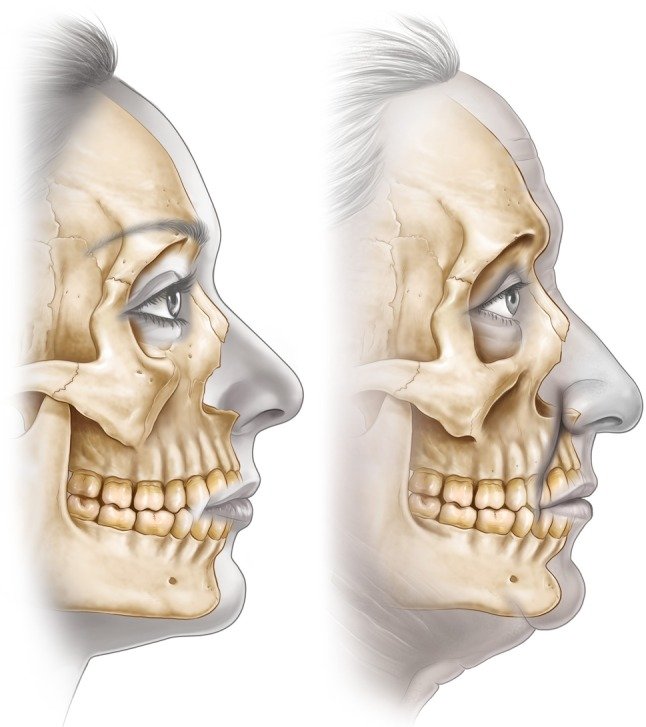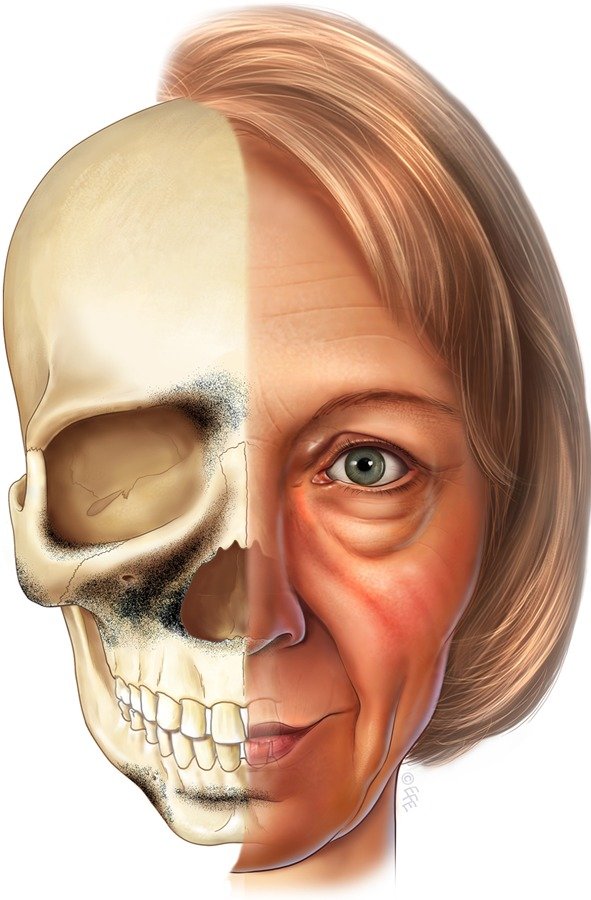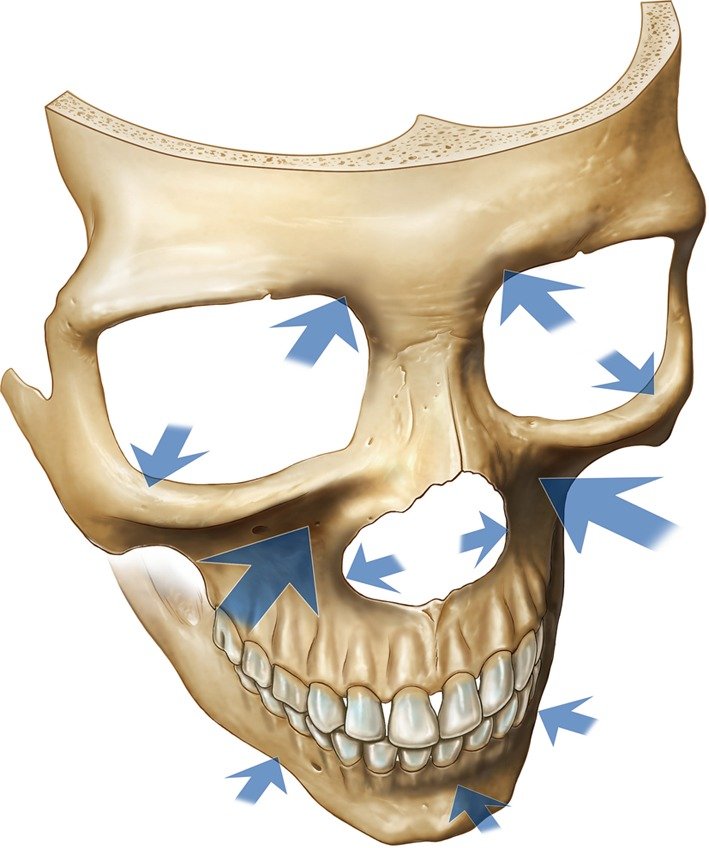The loss of bone in the pyriform area weakens the support of the lateral crura. Deepening of the maxilla results in posterior positioning of the nasolabial crease and adjacent upper lip. Changes in the Facial Skeleton With Aging: Implications and Clinical Applications in Facial Rejuvenation. Bryan Mendelson and Chin-Ho Wong, published in Aesthetic Plast Surg. 2012; 36(4): 753–760. Published online 2012 May 12. doi: 10.1007/s00266-012-9904-3, PMCID: PMC3404279, PMID: 22580543, https://www.ncbi.nlm.nih.gov/pmc/articles/PMC3404279/
Deborah Tosline wrote and published “Skin Remodeling DIY: An Introduction to the Underground World of Do-It-Yourself Skincare” in 2015. Her approach to skin care is based on a scientific background, love of research and over 40 years of DIY skincare experience.
In 1979, Deborah Crowley invented facial resistance training and founded FlexEffect Facialbuilding (TM), a comprehensive program that uses resistance facial exercises to strengthen face and neck muscles. In 2010, Ms. Crowley published the third edition of her book and introduced Bone Jolting (TM) and Pressure Reps (TM) for bone remodeling. Research shows that facial bone volume decreases over time changing our appearance and enhancing folds and wrinkles in the overlying skin. Ms. Crowley was ahead of her time when she published the Bone Jolting (TM) and Pressure Reps (TM) bone remodeling program to address the startling changes of facial bone loss over time.
I purchased FlexEffect Facialbuilding (TM) 24 years ago and consistently practice the facial resistance exercises. I am not affiliated with FlexEffect Facialbuilding (TM). I was so focused on practicing my facial resistance exercises that I rarely completed the bone remodeling program. Fast forward 22 years and at about the age of 62 I finally took facial bone loss seriously. Bone loss reduces the bony facial foundation that supports the facial muscles and skin. As the facial skeleton looses volume, the overlying skin develops folds and wrinkles as it collapses over smaller facial bones.
The darker areas are those of the greatest bone loss. The stigmata of aging, manifested by the facial soft tissues, corresponds with the areas of weakened skeletal support. Changes in the Facial Skeleton With Aging: Implications and Clinical Applications in Facial Rejuvenation. Bryan Mendelson and Chin-Ho Wong, published in Aesthetic Plast Surg. 2012; 36(4): 753–760. Published online 2012 May 12. doi: 10.1007/s00266-012-9904-3, PMCID: PMC3404279, PMID: 22580543, https://www.ncbi.nlm.nih.gov/pmc/articles/PMC3404279/
Is bone loss preventable? Wolff’s Law, developed by Julius Wolff in the nineteenth century, states that healthy bone will adapt to an applied stress by becoming stronger. Likewise, if an applied stress declines, bone strength declines.
The concept of bone remodeling is based on Wolff’s Law. For example, dentists and physical therapists rely on this concept for good dental results and to enhance physiological processes. We can use this concept in facial bone remodeling as well. Of course, one must strive towards an exceptionally healthy lifestyle to potentially experience optimum results.
Bone Remodeling Information
2010 – Ms. Crowley appears to be the first person to develop a facial bone remodeling program when she invented Jolting (TM) and Pressure Reps (TM) to stimulate facial bone rejuvenation and remodeling.
2011 – Research at the Baylor college of Medicine in Huston, correlates Ms. Crowley’s findings.
2012 – “Changes in the Facial Skeleton With Aging: Implications and Clinical Applications in Facial Rejuvenation.” Bryan Mendelson and Chin-Ho Wong, published in Aesthetic Plast Surg. 2012; 36(4): 753–760. Published online 2012 May 12. doi: 10.1007/s00266-012-9904-3, PMCID: PMC3404279, PMID: 22580543.
2023 – “Insight into age-related changes of the human facial skeleton based on medieval European osteological collection.” Walczak, A., Krenz-Niedbała, M. & Łukasik, S. Insight into age-related changes of the human facial skeleton based on medieval European osteological collection. Sci Rep 13, 20564 (2023). https://doi.org/10.1038/s41598-023-47776-4.
Information is limited but my recent search showed that there are more scientific research articles available on this topic.
Check out the images and full open source article from the Aesthetic Plast Surg. publication.
Facial skeleton imaging greatly improved when Computed Tomography 3D or 3-D CT scanners became available. These images provide more accurate measurements and a better understanding of facial skeletal aging. Primary facial resorption sites were identified in portions of the periorbital (eye socket), mid cheek regions and in the mandible (jaw). Not all facial areas were investigated.
https://www.ncbi.nlm.nih.gov/pmc/articles/PMC3404279/, LadyofHats, Public domain, via Wikimedia Commons
The 3-D CT imaging showed that facial bones that became less prominent over time correspond to facial areas that exhibit the most evidence of aging. Facial bone loss appears to exaggerate drooping eyebrows, cause the skin around the orbital eye rim to recess, increase soft tissue changes in the midcheek, worsen tear-trough deformity, increase mounds beneath the eyes, promote a prominent nasolabial fold and groove and a prominent jowl on the jawline.
A youthful facial skeleton defines our appearance and provides good structural support for the muscles and skin. Facial aging is attributed to changes in soft tissue and bone loss which modify our appearance as we age. Facial bone resorption reduces support for soft tissue and changes how we look. Facial skeleton strengthening should be taken into consideration to maintain the original facial architecture and to achieve facial rejuvenation.
Arrows indicate the areas of the facial skeleton susceptible to resorption with aging. The size of the arrow correlates with the amount of resorption. Changes in the Facial Skeleton With Aging: Implications and Clinical Applications in Facial Rejuvenation. Bryan Mendelson and Chin-Ho Wong, published in Aesthetic Plast Surg. 2012; 36(4): 753–760. Published online 2012 May 12. doi: 10.1007/s00266-012-9904-3, PMCID: PMC3404279, PMID: 22580543, https://www.ncbi.nlm.nih.gov/pmc/articles/PMC3404279/
Medical interventions such as fillers may be used to replace facial volume after bone loss. However, facial bone resorption may result in weak and porous facial bones. Fillers may fracture weak facial bones and it may not be possible or desirable to use them. Personally, I am not into fillers. I’d rather practice facial resistance exercises and natural bone rejuvenation methods to plump my muscles and strengthen my bones instead of relying on fillers.
The food that you eat not only impacts your health but also impacts facial bones. Consuming fresh whole crunchy chewy food applies a strengthening pressure to facial bones. Research suggests that modern humans are experiencing a faster rate of facial resorptive changes than historic humans as a result of eating soft food. Consuming soft food is associated with reduced biomechanical jaw forces and facial skeletal bone volume loss. Chewing hard foods strengthens facial bones.
maintain facial bone structure and reduce facial bone loss:
eat hard foods
practice mewing which uses natural tongue placement to support facial bones
practice facial strength training exercises
implement facial bone remodeling methods
The only published Do-It-Yourself bone maintenance program for bone remodeling that I am aware of is Ms. Crowley’s FlexEffect (FE) Facialbuilding (TM) - Bone Jolting (TM) and Pressure Reps (TM). Her book costs $69 for the entire package and $29 for a partial package. Again, I am not affiliated.
I’ve rarely practiced the Bone Jolting (TM) and Pressure Reps (TM) exercises due to time constraints. Instead, I diligently and consistently practiced FE Facialbuilding (TM) over 24 years. The photos below show me over a 10-year period from 2014 to 2024. Facial resistance exercises have helped me maintain strong facial muscles and good facial bone health but, I would like stronger facial bones. Over the past two years, I sporadically exerted pressure on my facial bones using unconventional methods. It is time for me to integrate a well developed bone remodeling program into a consistent weekly routine.
Executive decision: I will implement a consistent practice using Bone Jolting (TM) and Pressure Reps (TM) to enhance my facial maintenance program and plan to share my results and opinion based on my anecdotal experience. This will take time. Will I be able to remodel my cheek bones? Photos in a year?
The world is scary these days. I am going to escape reality for a little bit each week and take a serious yet light hearted approach to skin care with these bone remodeling exercises.
If you can find another bone remodeling program, please share it with us.
If you need more information, check out the local library, search the Internet, or check out my past Blog articles. It would be an honor for me if you purchased my facial care book. Thank you!
Take good care of yourselves!
XO Deborah
This article is intended to be used as general information only and is in no way intended to replace medical advice, be used as a medical treatment program, diagnosis, or cure of any disease or medical condition. There are no warranties, expressed or implied, regarding the effectiveness of the practices described in this article. Products or substances discussed herein are for educational purposes only and are not intended as recommendations of the author.




